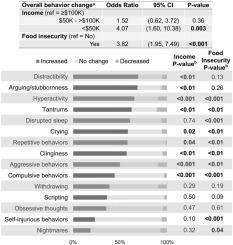Research in Developmental Disabilities ( IF 2.9 ) Pub Date : 2021-06-01 , DOI: 10.1016/j.ridd.2021.104002 Anita A Panjwani 1 , Regan L Bailey 2 , Bridgette L Kelleher 3

|
Background
Research on the impact of the COVID-19 pandemic on behaviors of children with autism spectrum disorder (ASD) is lacking.
Aims
This study investigates the relationship between COVID-19 and behaviors of children with ASD living in the United States.
Methods and procedures
Parents and caregivers (n = 200) across the United States, as proxies for children 2-17 years of age with ASD, participated in an online survey querying changes in overall behavior and 15 specific behaviors during the COVID-19 pandemic. Logistic regression was used to assess the association of a moderate-to-large impact on the child’s overall behavior with household income level and food security status.
Outcomes and results
A majority of respondents reported a moderate-to-large impact on the child’s overall behavior (74%) due to COVID-19. Several specific behaviors were also affected. Stratifying by income level and food security status revealed disparities in the impact on overall behavior and most specific behaviors. Compared to a household income ≥$100 K, an income <$50 K was associated with an increased risk of moderate-to-large impact on the child’s overall behavior (odds ratio (OR): 4.07, 95% CI: 1.60, 10.38). Food insecurity also significantly impacted this risk, even after adjusting for potential confounding factors (OR: 3.31, 95% CI: 1.13, 9.66).
Conclusions and implications
Our findings show a large proportion of caregivers reporting moderate-to-large changes post-COVID-19 in the behaviors of U.S. children with ASD, particularly in families with low income and/or food insecurity. This study highlights the effects of existing disparities on children with ASD and their families during this unprecedented time.
中文翻译:

COVID-19 和自闭症谱系障碍儿童的行为:收入和粮食安全状况的差异
背景
缺乏关于 COVID-19 大流行对自闭症谱系障碍 (ASD) 儿童行为影响的研究。
宗旨
本研究调查了 COVID-19 与居住在美国的 ASD 儿童行为之间的关系。
方法和程序
美国各地的父母和看护者 (n = 200) 作为 2-17 岁自闭症儿童的代理人,参与了一项在线调查,询问 COVID-19 大流行期间整体行为和 15 种特定行为的变化。逻辑回归用于评估对儿童整体行为的中等到较大影响与家庭收入水平和粮食安全状况之间的关联。
结果和结果
大多数受访者报告说,COVID-19 对孩子的整体行为产生了中等到较大的影响 (74%)。一些特定的行为也受到影响。按收入水平和粮食安全状况进行分层揭示了对整体行为和大多数特定行为的影响存在差异。与家庭收入 ≥ 100,000 美元相比,收入 <50,000 美元与对儿童整体行为产生中度至重大影响的风险增加相关(比值比 (OR):4.07,95% CI:1.60,10.38)。食品不安全也显着影响了这种风险,即使在调整了潜在的混杂因素后也是如此 (OR: 3.31, 95% CI: 1.13, 9.66)。
结论和启示
我们的研究结果显示,很大一部分护理人员报告说,在 COVID-19 之后,美国患有 ASD 儿童的行为发生了中等到较大的变化,特别是在低收入和/或粮食不安全的家庭中。这项研究强调了在这个前所未有的时期内现有差异对自闭症儿童及其家庭的影响。











































 京公网安备 11010802027423号
京公网安备 11010802027423号